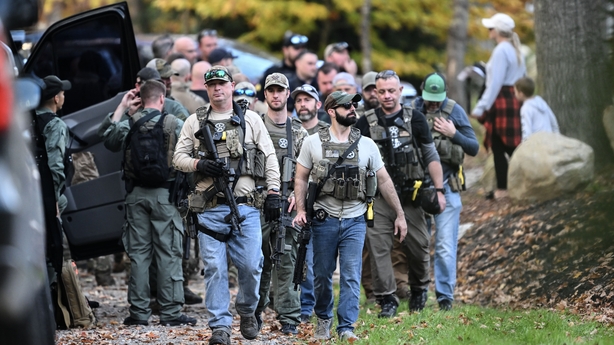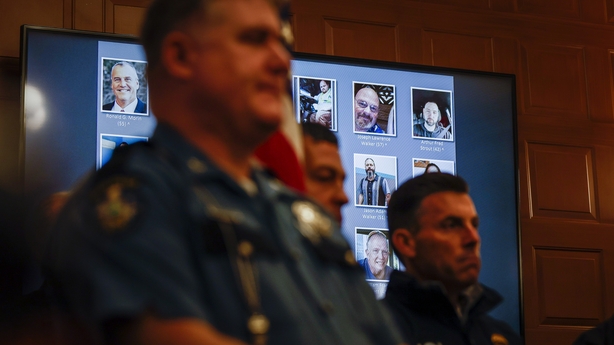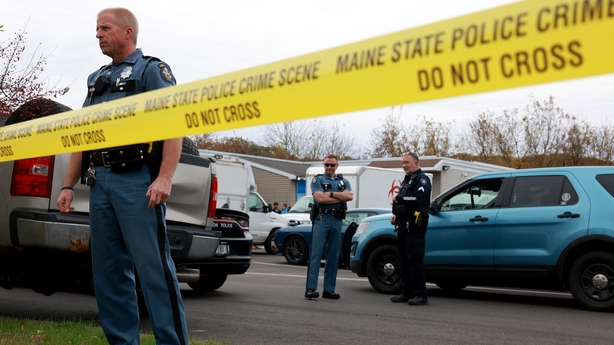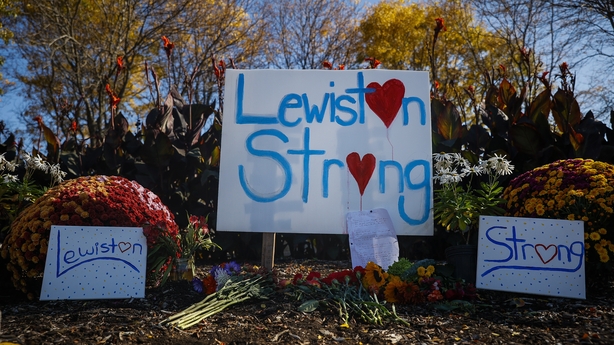Five months before a US Army reservist shot dead 18 people at a bar and bowling alley in Lewiston, Maine, his family contacted the sheriff's office to say they were concerned about a decline in his mental health and that he had access to at least ten guns.
A second report came through in September, when Robert R Card's Army Reserve unit in the nearby town of Saco emailed the Sagadahoc County Sheriff's Office requesting a "wellness check" on Card, Sheriff Joel Merry said in a statement.
The reserve unit told the sheriff's office that Card, a 40-year-old sergeant, had reported "hearing voices", and that he had threatened to "shoot up" the military facility, according to an incident report released by the sheriff's office.
At least one soldier who was friendly with Card told his seniors that his speech and conduct were so alarming that he feared that "Card was going to snap and commit a mass shooting", according to the Army Reserve unit's September email released by the sheriff's office.
On 25 October, Card killed 18 people, including a father and his 14-year-old son, and wounded 13 at two Lewiston venues.
He opened fire at the Just-In-Time Recreation bowling alley and minutes later at at Schemengees Bar & Grille Restaurant, which hosted Wednesday night cornhole games.
After a two-day manhunt, police found Card dead by suicide in a trailer at a recycling plant where he used to work.

Reuters was not able to contact Card's relatives or officials at the Army Reserve unit. A US Army spokesperson did not immediately respond to queries.
In a statement to the New York Times, the Army Reserve said it had reached out to the sheriff's office about Card "out of an abundance of caution after the unit became concerned for his safety".
As in many US states, guns are lightly regulated in Maine and no permit is required to buy or carry one.
In 2022, however, the state passed a so-called "yellow flag law" that allows police to petition a court for an order allowing them to temporarily seize guns from a person who a medical practitioner has deemed may be in danger of hurting themselves or others.
Law enforcement has said Card was committed to a mental health facility in July for two weeks.
His ability to carry out a massacre has raised questions about the efficacy of the state's gun regulations and where the limits lie in a 2022 US Supreme Court ruling that found a constitutional right for individuals to carry weapons in public.
In the account provided by the Sagadahoc County sheriff, his office agreed not to make contact with Card after his teenaged son and ex-wife reported their concerns on 3 May, in which they told a deputy that Card's anger and paranoia worsened after he got a hearing aid in February.

Instead, a sheriff's deputy spoke with officials at the 3rd Battalion 304 Training Group and connected them with Card's family. The battalion officials "assured our office that they would ensure that Card received medical attention", the sheriff's office said in the statement.
When, months later, the Army Reserve unit sought a wellness check on Card, another sheriff's deputy attempted to visit Card at his trailer home in Bowdoin on 15 and 16 September, but there was no answer, the office said.
The deputy circulated a missing-person notice among Maine law enforcement offices with Card's physical description and a warning he should be considered armed and dangerous.
After conferring with the Army Reserve unit and Card's brother the sheriff's office made no further attempts to contact Card: Card's unit commander told the deputy that Card no longer had any weapons from the reserve unit.

"His commander advised that they were trying to get treatment for Mr Card and that he thought it best to let Card have time to himself," the sheriff's office said.
Card's brother told the deputy he "would work to secure any firearms that Mr Card had access to" and that he would call the sheriff's office back if they were worried about him again.
"We believe that our agency acted appropriately and followed procedures for conducting an attempt to locate and wellness check," Sheriff Merry's statement said.
The sheriff's office said it cancelled the missing-person alert for Card on 18 October.
Four of those killed belonged to the deaf community. Nine deaf people were playing in a weekly tournament at Schemengees, the sister of one of the victims told the Lewiston Sun Journal.
Among them was Joshua Seal, 36, the director of interpreting services for the Pine Tree Society, who provided vital interpreting services for people isolated during the coronavirus pandemic.
Stephen Vozella, 45, was a postal worker and active member of New England Deaf Cornhole, the group said on its Facebook page.
Bryan MacFarlane, 41, an avid motorcyclist, was also part of the deaf cornhole tournament at Schemengees, his sister Keri Brooks told the Sun Journal.
Bill Young, 44, and his 14-year-old son Aaron were shot and killed while bowling together, Bill's brother Rob Young told Reuters.

Husband and wife Bob Violette, 76, and Lucille Violette,73, were also bowling together in a couples league when they were killed, the Sun Journal reported, citing his daughter-in-law, Cassandra Violette.
Tricia Asselin, 53, was a part-time worker at the bowling alley who was trying to call 911 when she was shot.
Joseph Walker, 57, was a manager at Schemengees who stayed on the scene to help even though he could have escaped through a door near his office, his father, Leroy Walker, told Reuters.
"We were told that he picked up a butcher knife from the bar area where he was a lot of the time standing and went to attack the shooter," Leroy Walker said.
The gunman then shot Joseph, known to his Dad as Joey, killing him instantly.

